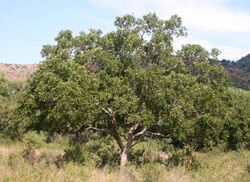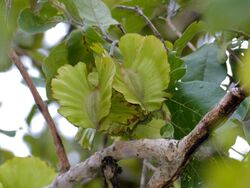Biology:Combretum zeyheri
From HandWiki
Short description: Species of plant
| Combretum zeyheri | |
|---|---|

| |
| Near Johannesburg | |

| |
| Winged fruit | |
| Scientific classification | |
| Kingdom: | Plantae |
| Clade: | Tracheophytes |
| Clade: | Angiosperms |
| Clade: | Eudicots |
| Clade: | Rosids |
| Order: | Myrtales |
| Family: | Combretaceae |
| Genus: | Combretum |
| Species: | C. zeyheri
|
| Binomial name | |
| Combretum zeyheri Sond.
| |
| Synonyms[1] | |
|
List
| |
Combretum zeyheri, the large-fruited bushwillow or Zeyher's bushwillow, is a species of flowering plant in the family Combretaceae, usually found growing on acidic or sandy soils in tropical African savannas.[1][2] A small to medium-sized tree, its roots are used as a source of material for making baskets and as a traditional medicine for haemorrhoids.[3]
Two interlocking wooden logs from a large-fruited bushwillow, connected by a notch, comprise the Kalambo structure. Located at Kalambo Falls, Zambia, and dating to roughly 476,000 years ago, the Kalambo structure is the oldest known wooden structure.[4]
References
- ↑ 1.0 1.1 "Combretum zeyheri Sond." (in en). Royal Botanic Gardens, Kew. http://www.plantsoftheworldonline.org/taxon/170592-1.
- ↑ Neke, Kirsten S.; Owen-Smith, Norman; Witkowski, Ed T.F. (2006). "Comparative resprouting response of Savanna woody plant species following harvesting: The value of persistence". Forest Ecology and Management 232 (1–3): 114–123. doi:10.1016/j.foreco.2006.05.051.
- ↑ Malatji, Refilwe Maria (May 2015). "Combretum zeyheri Sond.". South African National Biodiversity Institute (SANBI). http://pza.sanbi.org/combretum-zeyheri.
- ↑ Barham, L.; Duller, G. a. T.; Candy, I.; Scott, C.; Cartwright, C. R.; Peterson, J. R.; Kabukcu, C.; Chapot, M. S. et al. (20 September 2023). "Evidence for the earliest structural use of wood at least 476,000 years ago" (in en). Nature: 1–5. doi:10.1038/s41586-023-06557-9. ISSN 1476-4687. PMID 37730994. https://www.nature.com/articles/s41586-023-06557-9.
Wikidata ☰ Q15574368 entry
 |

